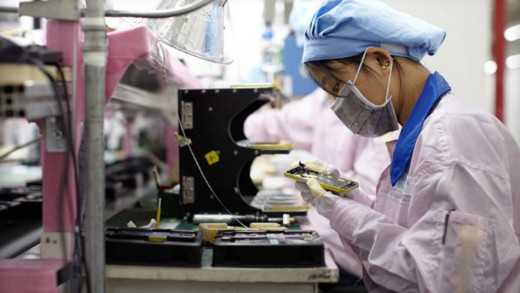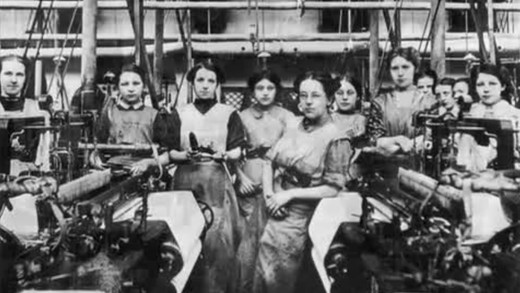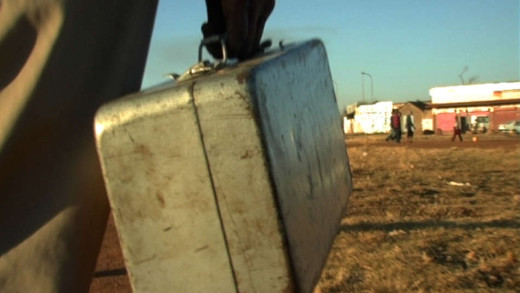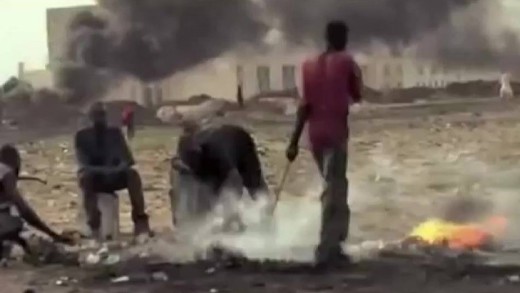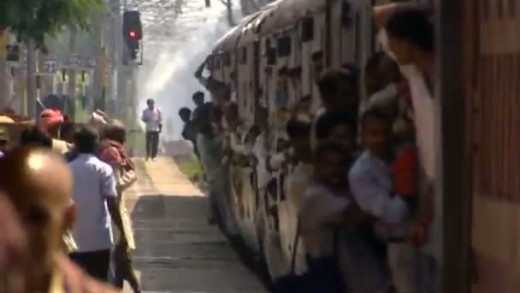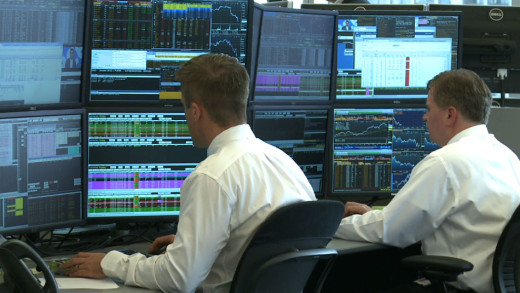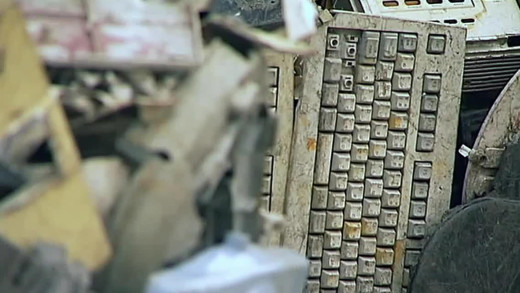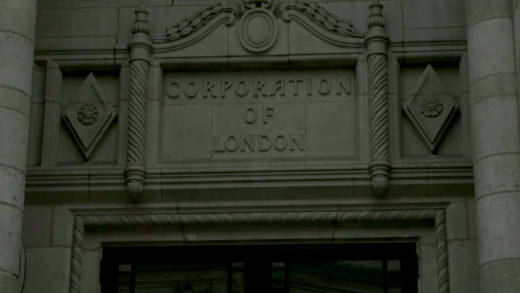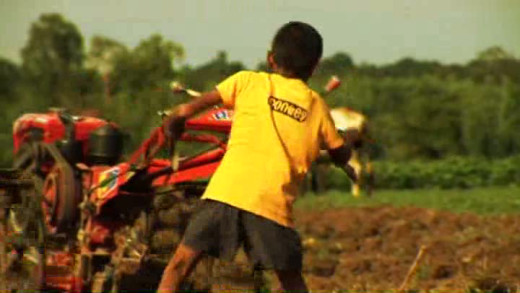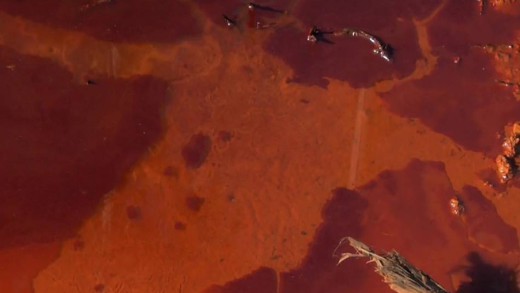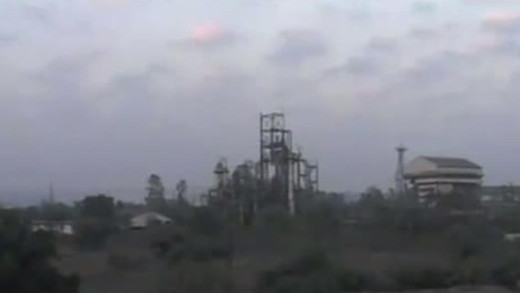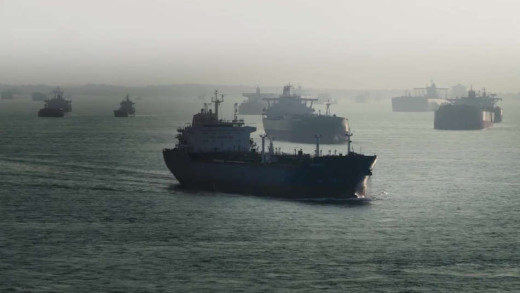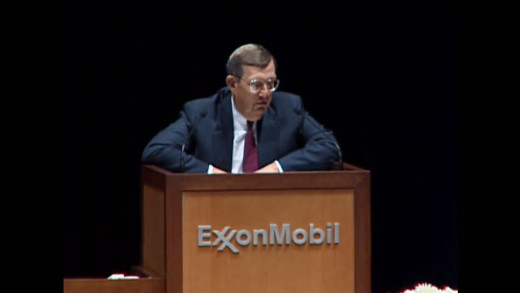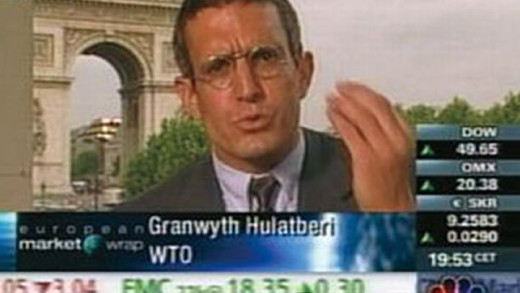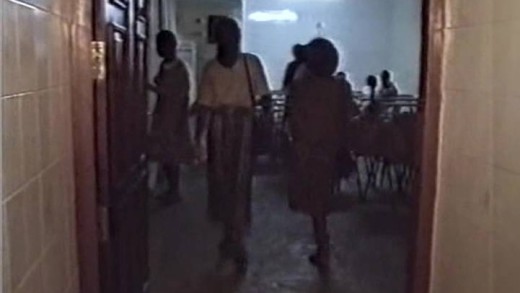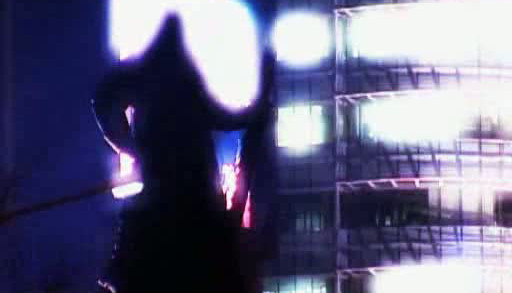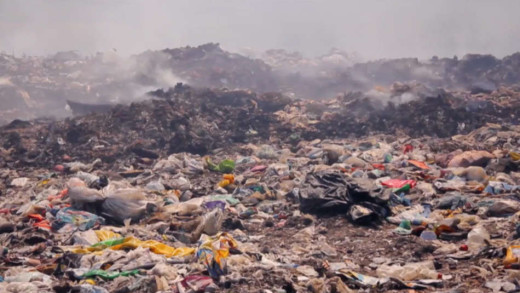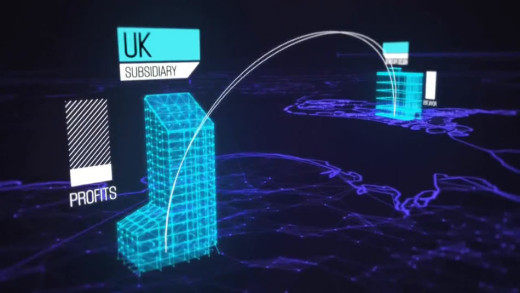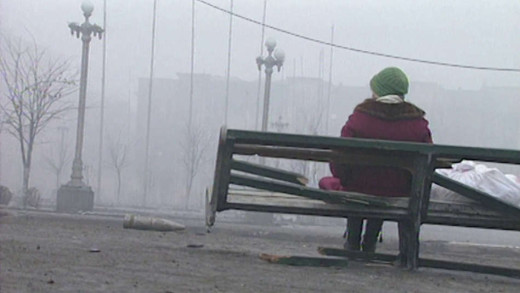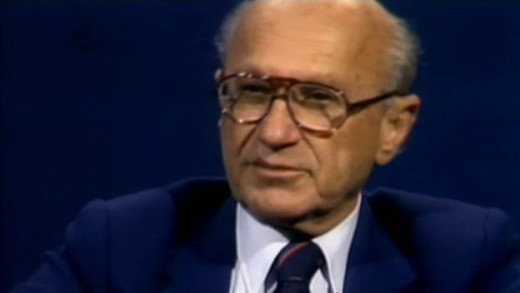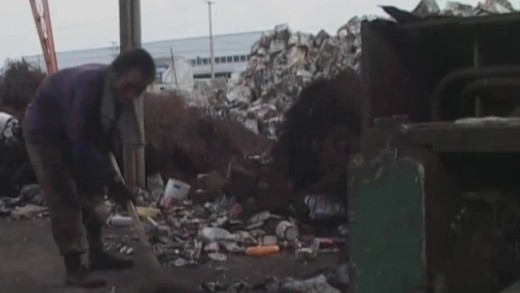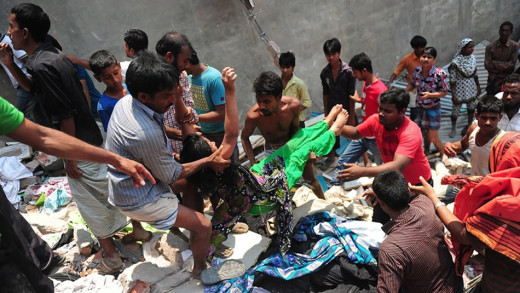As high-technology permeates further into the industrialised world, manufacturers will go to any lengths to get the raw materials to make their gadgets. Coltan from the Congo is one such rare ingredient. Few in the west know where their gadgets come from and that in the middle of Africa much human suffering is created in the pursuit of "technological advancement"...
Complicit
Filmed over 3 years, Complicit is an undercover investigation into the lives and conditions of workers that assemble iPhones, tablets, and other electronics in factories such as Foxconn in Shenzhen and Guangzhou, China. The film reveals the global economy's factory floors, showing the conditions under which China's youth have migrated by the millions in search of the espoused "better life" working for big corporations. But the reality is working long hours with toxic chemicals that cause many cumulative detrimental health conditions, including cancers. As such, a focal point of the story is Yi Yeting, who takes his fight against the global electronic industry from his hospital bed to the international stage. While battling his own work-induced leukemia, Yi Yeting teaches himself labour law in order to prepare a legal challenge against his former employers. As the struggle to defend the lives of millions of Chinese people from becoming terminally ill from work necessitates confrontation with some of the world’s largest corporations, including Apple and Samsung, Complicit turns to become a powerful portrait of courage and resistance against screens and rapacious corporate power in a toxic culture.
The End of Poverty? traces the growth of global poverty back to colonisation in the 15th century to reveal why it's not an accident or simple bad luck that there is a growing underclass around the world. Featuring interviews with a number of economists, sociologists, and historians, the film details how poverty is the clear consequence of free-market economic policy which has allowed powerful nations to exploit poorer ones for their assets, turning the money back to the hands of the concentrated few. This also follows on to how wealthy nations--especially the United States--thereby exert massive debts, seize a much disproportionate exploit of the natural world, and how this deep imbalance has dire consequences on the environment and on people...
The Big Sellout reveals the reality of privatisation and globalisation by examining the corporate takeover of basic public services throughout the world, such as water supply, electricity, public transportation, and public health care. In South America, Asia, Africa, but also in Europe and the United States, filmmaker Florian Opitz talks to the architects of the new economic world order, as well as to ordinary people who have to deal with the real direct effects. The result is a tapestry of narratives the world over that show where the dogma of privatisation cames from, who profits from it, what societies lose, and why resistance is so important.
The myths of globalisation have been incorporated into much of our everyday language. "Thinking globally" and "the global economy" are part of a jargon that assumes we are all part of one big global village, where national borders and national identities no longer matter. But what is globalisation? And where is this global village? In some respects you are already living in it. The clothes in your local store were probably stitched together in the factories of Asia. Much of the food in your local supermarket will have been grown in Africa...
A group of graduate journalism students from the University of British Columbia travel to the outskirts of Ghana as part of a global investigation tracking the shadowy industry of e-waste that's causing big environmental problems around the world. Their guide is a 13-year-old boy named Alex. He shows them his home, a small room in a mass of shanty dwellings, and offers to take them across the dead river--which is literally dead--to a notorious area called Agbogbloshie which is one of the world's unseen e-waste dumping grounds. Hundreds of millions of tons of waste are funnelled here each year, with more to come as the consumer boom of computers and gadgets increases across the globe--unless drastic action changes the flow of waste and addresses the terrible conditions many have to endure for the technocracy of the West.
Child Slavery
Around 8.4 million children around the world are enslaved today. Child Slavery travels across three continents, focusing on five children and their stories...
"Quants" are the mathematicians, software developers and computer programmers at the centre of the global economy. These are the people who designed the "complex financial products" that caused the financial crisis of 2008. Here they speak openly about their game of huge profits, and how the global economy has become increasingly dependent on mathematical models that quantify commodified human behaviours to the point of insanity. But things don't stop there. Through the convergence of economy and technology, the Quants have now brought this model into the world of the machines, where trades are done at the speed of light, far from the realm of human experience. The machines are in charge. Some Quants are even now worried. What are the risks of this complex machine? Will the Quants be able to keep control of this financial system, or have they created a monster?
China's factories provide low cost products such as computers and cars to the rest of the world, but the real cost is high with heavy air pollution, contaminated waterways, decimated land, terrible working conditions, widespread cancer and incidences of deaths. China's Dirty Secrets travels across the country to follow workers at factories that assemble computers, then to e-waste dumps, and finally an industrial incinerator burning medical waste, all showing first-hand the extensive environmental impacts of so-called "economic growth."
The Spider's Web: Britain's Second Empire shows how Britain transformed from a colonial power into a global financial power. At the demise of empire, the City of London's financial interests created a web of offshore secrecy jurisdictions that captured wealth from across the globe and hid it behind obscure financial structures, and webs of offshore islands. Today, up to half of global offshore wealth may be hidden in British offshore jurisdictions, and these are now the largest players in the world of international finance. Based in part on the book Treasure Islands by expert Nicholas Shaxson, and through contributions from former-insiders, academics, and campaigners for justice, The Spider's Web reveals how, in the world of international finance, corruption and secrecy have prevailed over regulation and transparency, and how the United Kingdom is a pioneer of the modern corrupt global economy.
Filmed in Thailand and the Philippines in July 2007, Squeezed tells the story of how free trade agreements and globalisation are changing the lives of millions of people living in the Asia-Pacific region with APEC. Featuring interviews with farmers, workers and slum-dwellers, the film travels across the landscapes of Asia, from the lush rice paddies of Thailand to squatter settlements perched on a rubbish dump in urban Manila. Documenting these contrasts and contradictions, Squeezed accounts the impact of globalisation...
A new gold rush is sweeping through the Amazon rainforest where scores of people are bustling in to hunt for the last nuggets and specks of gold. This insatiable rush is perpetuating the further destruction of one of the largest remaining tropical forests in the world; bringing with it weapons, mercury, crime and alcoholism, and turning once pristine creeks and rivers into dumping grounds for mining. In the forest also lies the story of the Wayanas, a Native American tribe from Guiana, who are being poisoned by the mercury releases from the mining. Their communities are enduring one of the world's worst globalisation disasters, fighting back against all odds.
In October 2003, an extraordinary uprising challenged the United States empire and kicked out President Gonzalo Sánchez de Lozada -- a representative of the United States administration and transnational corporate interests. The people are calling for new forms of representation and organisation that question the portrayed notions of democracy and traditional political parties. In February 2003, a mutiny by the police against the imposition of income taxation on the poor to fulfil IMF demands, provoked the withdrawal of tax measures; throughout 2002, peasants revolted against the US-imposed 'coca war' -- the coca-eradication plan -- that would've destroyed the only possible source of survival for thousands of people. In 2001, the people of Cochabamba fought successfully against the a most outrageous form of privatisation -- of the water supply -- forcing the government to cancel the agreement with Bethell, a US-based company...
90% of the consumer products are manufactured overseas, delivered by ship. Likewise with individual supplies, assembly parts, and even transportation oil itself. The shipping industry is the core of the globalised economy. Yet this industry remains largely obscure and unquestioned. As modern ships are too large to fit in traditional city harbours, they've moved out of the public eye, behind extensive barriers and security check points. Freightened: The Real Price of Shipping aims to open up this hidden world. What pulls the strings in this multi-billion dollar global business? To what extent does it control policy makers? How does it affect the environment above and below the water-line? And what's life like for modern seafarers? Through journeys over many oceans, Freightened is an investigation the hidden machinations of globalised shipping, revealing its ubiquitousness but fragility, consequences and future.
Corporations On Trial is a five-part series following just some of the many lawsuits being brought against multinational corporations for war crimes, conspiracy, corruption, assassinations, environmental devastation and payments to terrorists. Such serious charges have forced some of the world's largest companies to hire high-profile defence lawyers to protect public relations in cases often brought by plaintiffs who are barely literate. These five films reveal a growing anxiety about the power and influence of big business, as many multinational corporations have annual revenues greater than some countries' national budgets and indeed increasingly hold governments to ransom by their economic power. Around the world, ordinary people are fighting back and asking how many more times their interests should be sacrificed for corporate greed and shareholder profit...
The Power of Big Oil is a three-part series that investigates the decades-long failure to confront the threat of climate change and the role of the fossil fuel industry. The series presents a parade of former oil company scientists, lobbyists, and public relations strategists who lay bare how the biggest petroleum firm in the United States, Exxon, and then the broader petroleum industry globally, moved from attempting to understand the causes of a global heating to a concerted campaign to hide the making of an environmental catastrophe. Over three episodes--Denial, Doubt, Delay--the series documents the corporate cooptation of science, the manipulation of public opinion, and political figureheads that mirror conduct by other industries--from big tobacco to the pharmaceutical companies responsible for the opioid epidemic.
The Yes Men are a culture-jamming activist-duo from the United States that are known for their impersonations of entities that they dislike as a form of protest. Using spoofed personas, they spread awareness of problematic social issues through the mainstream media. The two have also created and maintained fake websites, which have even led to numerous interviews, conferences, and TV invitations for their spoofed personas to espouse the truth about just how corporations and governmental organisations often act in dehumanising ways toward the unwitting public. In this film, we see how the two Yes Men take on the World Trade Organisation and confront the brutal realities of globalisation using satire and tactical media to get their message across, culture-jamming the corporate interest.
Globalisation has gone to great lengths to coerce many countries around the world to open 'free trade zones' for Western markets, where businesses receive special tax benefits and other rewards for operating factories and exploiting cheap labour. The argument, as is always cited, is for growth of the global economy. Free Trade Slaves sets out to examine these ideas by looking at the realities of such practice. Told from the perspective of the workers in Sri Lanka, El Salvador, Mexico and Morocco; the film exposes systemic human rights abuses, harrowing environmental destruction, birth defects and other long lasting health problems and social issues. The filmmakers suggest that workers around the world need to assert the right to unionise and organise together to demand and retain decent conditions, and that consumers should do their part by boycotting companies that continue to abuse people and the environment.
From the front-lines of conflicts in Mexico, Argentina, South Africa, Palestine, Korea, and the North; from Seattle to Genova and the "War on Terror" in New York, Afghanistan, and Iraq, The Fourth World War documents the stories of women and men all around the world who resist being annihilated in this war. Centred around economics and systems such as NAFTA, GATT, the G20, APEC and others, this is a war which plays along with the spread of rapacious globalisation, a feat that has pervasive consequences in the real world...
Trashed
Trashed sets out to discover the extent and effects of garbage on the natural world. The film travels to beautiful destinations now tainted by pollution, through conversations with scientists, politicians, and people whose health and livelihoods have been fundamentally effected by waste. We see unfettered garbage dumping in Lebanon effecting its own coastline, but also the entire Mediterranean sea; toxic waste mounds set near a school and a future hospital in England; garbage incinerators in Iceland and Japan; the effects of plastic, microplastics, chemical sludge, flame retardants, pesticides, herbicides, dioxins, and other chemicals from waste and their synergistic impacts the world over. Trashed is a call for urgent action to resolve the issue of existing waste, to drastically reduce consumption and output to significantly less harmful levels, while demonstrating how this is already being reached for in many communities around the world.
The Tax Free Tour travels the globe to expose the workings of offshore tax havens and the elite banking systems of the world's billionaires which operate in extreme secrecy. Using examples from multi-national corporations such as Apple Computer and Starbucks, the film traces sizeable capital streams that travel the world literally in milliseconds--all to avoid local laws and paying tax. Such routes go by resounding names like 'Cayman Special', 'Double Irish', and 'Dutch Sandwich'. The Tax Free Tour is a sobering look at how the world's rich live in an entirely different world than the rest of us...
Since the late 1980s, BBC news crews have filmed all across the Soviet Union and Russia, but only a tiny portion of their footage was ever used for news reports. The rest was left unseen on tapes in Moscow. Filmmaker Adam Curtis obtains these tapes and uses them to chronicle the collapse of the Soviet Union, the rise of capitalist Russia and its oligarchs, and the effects of this on Russian people of all levels of society, leading to the rise to power of Vladimir Putin, and today's invasions of Ukraine. The films take you from inside the Kremlin, to the frozen mining cities in the Arctic circle, to tiny villages of the vast steppes of Russia, and the strange wars fought in the mountains and forests of the Caucasus.
By comparing the confluence of ideas about modifying behaviour using shock therapy and other forms of sensory deprivation (which culminated in the top-secret CIA project called MKULTRA during the 1950s) alongside the metaphor of similar shock treatment modifying national economics using the teachings of Milton Friedman and the Chicago School of economics, The Shock Doctrine presents the workings of global capitalism in this framework of how the United States, along with other western countries, has exploited natural and human-engineered disasters across the globe to push through reforms and set-up other mechanisms that suit those in power and 'shock' other countries into a certain wanted behaviour. Chronologically, some historical examples are the using of Pinochet's Chile, Argentina and its junta, Yeltsin's Russia, and the invasion of Iraq. A trumped-up villain always provides distraction or rationalisation for the intervention of the United States—for example, the threat of Marxism, the Falklands, nuclear weapons, or terrorists—and further, is used by those in power as more justification for the great shift of money and power from the many into the hands of the few(er).
Heavy Metal
For more then twenty years, many hundreds of tons of electronic waste--or e-waste--from all around the world has been transported to an infamous Chinese town called Fengjang, just south of Shanghai, for disposal and so-called 'recycling.' Around 50,000 migrant workers constitute part of the massive workforce necessary to dispose of e-waste, with the downcycling component of the operations involving cutting, splitting, and salvage--most-often with rudimentary equipment. The workers toil endlessly to process almost 2 million tons of garbage every year, bearing incredible precariousness, and even putting in danger their own health due to the simply unacceptable working conditions and also the toxic characteristics of the metals, chemicals and materials they're handling. As the recognisable heaps of waste continue to pile up, Heavy Metal provides a moving image of a worldwide consumer society and the stark direct impacts of an 'invisible' waste.
In June 2010, leaders from the twenty largest economies met in Toronto, Canada with representatives of corporate interests to discuss the policies that shape globalisation. With exclusion zones, overlapping layers of security fencing and an estimated 25,000 police and military personnel, the city was transformed into an armed grid. Over 1.3 billion dollars were spent on security measures -- more than all previous G8 or G20 meetings combined. Tales From The G20 shows some sides of the Summit, from unmarked vans with snatch squads of plainclothes police to the pre-emptive arrest of people now facing years in prison for organising demonstrations or simply being on the street...
Diamond Empire is a two-part series that investigates how an advertising slogan invented by Madison Avenue executives in 1948 has come to define some of the most intimate and romantic rituals and ideals of this culture. The films take apart the myth that "diamonds are forever," exposing how one white South African family, through a process of monopoly and fantasy, managed to exert control over the global flow of diamonds and change the very way this culture projects the notion of courtship, marriage, and love--an achievement all the more stunning given that diamonds are in fact neither scarce nor imperishable. Zeroing in on how the diamond empire managed to convert something valueless into one of the most coveted commodities in history, these films provide a vigorous investigation into how marketing and consumer culture shape not only global trade and economics, but also our very identities.
Fashion Victims looks at the real cost of cheap clothes from the conditions of sweat shops in Bangladesh. On 24th April, 2013 more than a thousand people were killed when an eight storey building collapsed in the heart of Bangladesh's capital, Dhaka. The collapse of Rana Plaza turned the world's attention to the shocking conditions workers in the country's clothing industry are forced to endure. In recent years, Australian companies have flooded into Bangladesh to take advantage of lax labour laws and the lowest wages in the world, paid to the predominantly young, female workers in the factories.
Shifty
Shifty is a series of films that traverse the past 40 years in Britain, showing how the shift of political power to finance and hyper-individualism came together in powerful ways, to undermine one of the fundamental structures of mass democracy--the shared idea of what is real. As that fell apart, with it went the language and the ideas that people had turned to for the last 150 years to make sense of the world they lived in. As a result, life in Britain and the current and former colonies of its empire, has become strange--a hazy dream-like flux, where distrust in politicians keeps growing, and the political class seems to have lost control. Through archive footage, news reels, and on-screen-text in video essay format, Shifty documents the shapes of how this happened, using the vast ranges of footage to evoke what if felt like to live through an epic transformation during the 1980s.

